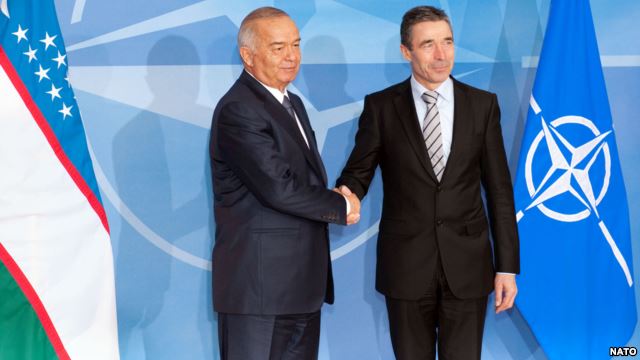 NATO formally opened its liaison office in Uzbekistan on Friday, a year after it started working and amid heightened Russian rhetoric about the western alliance encroaching on its backyard.
NATO formally opened its liaison office in Uzbekistan on Friday, a year after it started working and amid heightened Russian rhetoric about the western alliance encroaching on its backyard.
The opening itself was not a big deal: it only formalized a move that happened last year, which was itself described by NATO officials as just a "rotation" of NATO's representation in Central Asia from Astana to Tashkent. (NATO calls the new structure in Tashkent a "liaison office," while the preferred phrase in the Russian-language press seems to be the much more impressive-sounding "staff headquarters.") Nevertheless, the opening ceremony was held in a very different geopolitical atmosphere than obtained last year, and so it was inevitable that people would seek to try to figure out what it really meant.
Uzbekistan is unmistakably taking a different path than that of its neighbors. While Kazakhstan, Kyrgyzstan, and Tajikistan are all (to varying degrees) participating in Russia's economic and military integration schemes, Uzbekistan has resisted. And strategic concerns have overridden Western qualms about human rights, notes Tolganay Umbetaliyeva, the director of the Kazakhstan-based Central Asian Fund for the Development of Democracy. "In spite of the fact that after the Andijan events of 2005 relations between Uzbekistan and the West sharply deteriorated, their recent improvement can be seen as the West's response to the various integration processes of the post-Soviet Central Asian states and Russia in various spheres," she told RFE/RL.
Opposing Russia may be Tashkent's interest, and it may be a nice side benefit for NATO, but NATO would likely be very little interested in Uzbekistan if it weren't an important country for NATO and American military logistics for the war in Afghanistan. "The most important part of our cooperation remains the transit of cargo through Uzbekistan. And we are grateful to Uzbekistan for that," said James Appathurai, NATO's special representative for the Caucasus and Central Asia, at the opening ceremony.
And Appathurai, in an interview with RFE/RL, denied there was a geopolitical component to the office:
Appathurai said NATO's partnership with Central Asian nations is not in competition with their relationship with Russia.
He said, "We are not here to compete with anyone or to pressure anyone to make any sort of changes to their political orientation."
Moscow may not see it that way, said Kazakhstan analyst Daniyar Kosnazarov in a facebook post: "Moscow, of course, is likely to react strenuously to the news that a NATO headquarters will be in Uzbekistan. This will be explained, primarily, by the fact that Tashkent renounced its membership in the CSTO." There doesn't seem to have been any official reaction yet from Moscow; it also should be noted that just two years ago Russia itself allowed NATO to set up a transit hub in the city of Ulyanovsk, though it was never regularly used.
Uzbekistan's official news agency Jahon naturally downplayed any geopolitical meaning and described the function of the office as "facilitating practical cooperation of the North Atlantic alliance with partners in the region in various directions, including defense planning and analysis, providing support to alliance operations, military education and preparation, civil emergency planning, cooperation on scientific and environmental issues, and public diplomacy."
Anyway, it will be interesting to see if NATO decides to rotate this office to another Central Asian capital (Bishkek? Dushanbe?) and if so, how Moscow will respond.
EurasiaNet.Org




